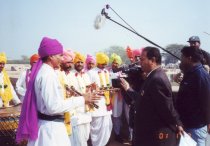"It is America's honor and gift to be a nation of nations, whose people and aspirations touch every nation on the face of the earth. From universal dreams of freedom, equality and prosperity, we became a country that melded many different cultures, ideas, perspectives, and talents — giving us a rich diversity that continues to make us strong today. With this strength comes great responsibility and a desire to engage with the international community. And words are not enough. Americans are committed to turning these visions into action." Colin L. Powell
When the United States reentered UNESCO, the State Department published this discussion of the reasons we belong in the organization. It makes good reading. It concludes:
The United States will again be the biggest financial contributor to UNESCO, paying 22 percent of the annual assessed budget, in addition to voluntary contributions. America will work to ensure that funds are spent efficiently and transparently.
With respect to education, the statement notes:
Education is the most important long-term investment that any country can make in its people and its future. It is an instrument for change. With UNESCO's support, nations can develop strong education programs. The United States has invested $333 million in international primary, secondary and college education in 2003......
The United States will work toward ensuring that UNESCO's education programs pay attention to civic education as a foundation of democratic governance and peace.
Education is essential for achieving the goals of the Millennium Declaration, which the United Nations adopted as a blueprint for building a better world. Literacy and education bring freedom, power and opportunity for people to transform themselves. The United States believes the world community cannot waste time if we are to meet UNESCO's goal of increasing global literacy by 50 percent by the year 2015.
Our nation is poised to rejoin UNESCO because — as President Bush pointed out — this organization is committed to advancing human rights, tolerance, and learning. It's a noble goal that we all share. We must devote ourselves to making education a universal reality now. Far too many have waited too long for this day to come." Rod Paige, U.S. Secretary of Education
With regard to culture, the statement includes the following:
UNESCO's role in preserving cultural heritage worldwide is aimed at helping nations better understand their own roots and each other. A long-term goal of the United States is to preserve cultural artifacts in those developing countries where such treasures are otherwise unprotected.......
The United States is one of the most culturally diverse nations on Earth. Such diversity stems from openness to and acceptance of cultural influences from around the globe. In addition to preserving cultural heritage, UNESCO has an obligation to encourage the exchange of cultural influences and cultural works that are essential to achievement of real cultural diversity and inter-cultural understanding.
Download the entire document setting forth the rationale. (August, 2003; PDF, 1.26MB)
 ACCU training in audio visual production
ACCU training in audio visual production